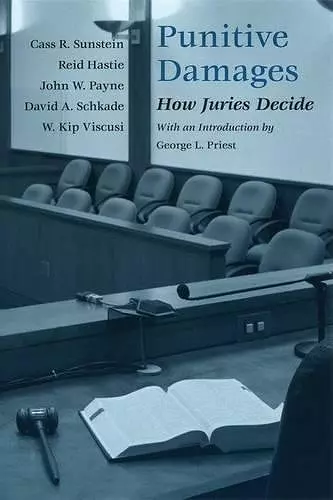Punitive Damages
How Juries Decide
W Kip Viscusi author Cass R Sunstein author Reid Hastie author John W Payne author David A Schkade author
Format:Hardback
Publisher:The University of Chicago Press
Published:16th Apr '02
Currently unavailable, and unfortunately no date known when it will be back

Over the past two decades, the United States has seen a dramatic increase in the number and magnitude of punitive damages verdicts rendered by juries in civil trials. Probably the most extraordinary example is the July 2000 award of $144.8 billion in the Florida class action lawsuit brought against the cigarette manufacturers. More puzzling were two recent verdicts against the auto manufacturer BMW in Alabama. In identical cases, argued in the same court before the same judge, one jury awarded $4 million in punitive damages, while the other awarded no punitive damages at all. In cases involving accidents, civil rights and the environment, multimillion dollar punitive awards have been a subject of intense controversy. But how do juries actually make decisions about punitive damages? To find out, the authors - specialists in psychology, economics and the law - present the results of controlled experiments with over 600 mock juries involving the responses of more than 8,000 jury-eligible citizens. They find that although juries tended to agree in their moral judgements about the defendant's conduct, they rendered erratic and unpredictable dollar awards. Jurors also tended to ignore instructions from the judges; showed "hindsight bias", believing that what happened should have been foreseen; and penalized corporations that had based their decisions on careful cost-benefit analyses. While judges made many of the same errors, they performed better in some areas, suggesting that judges (or other specialists) may be better equipped than juries to decide punitive damages. With a wealth of new data and a host of provocative findings, this book documents a wide range of systematic bias in jury behaviour and should be valuable for anyone interested in punitive damages, jury behaviour, human psychology and the theory of punishment.
"Punitive Damages pulls together a series of important empirical findings and situates them within a policy and methodological framework. It is accessible to nonspecialists and will certainly appeal to academics interested in jury behavior, as well as policy-makers considering the issue of punitive damages reform." - Christine M. Jolls, Harvard Law School
ISBN: 9780226780146
Dimensions: 23mm x 17mm x 2mm
Weight: 595g
296 pages